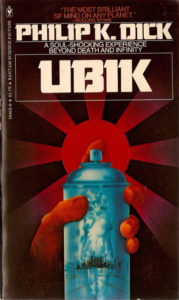 Intense competition between commercial firms is the opening setting for this classic sci-fi/fantasy set in 1992 (“the future” for Philip K. Dick, writing in 1969). These firms are in the industrial espionage business. One of them deploys an army of “psi” people, those who can read minds and steal commercial secrets. The opposing company, and the home of main character Joe Chip, is in the anti-psi business, deploying people who can detect and block the psi’s.
Intense competition between commercial firms is the opening setting for this classic sci-fi/fantasy set in 1992 (“the future” for Philip K. Dick, writing in 1969). These firms are in the industrial espionage business. One of them deploys an army of “psi” people, those who can read minds and steal commercial secrets. The opposing company, and the home of main character Joe Chip, is in the anti-psi business, deploying people who can detect and block the psi’s.
You can’t get much more “psi-fi” than that. But don’t let that mislead you. I chose “psi-fi” for this site and to name my genre of psychological fiction in a technological world, mainly because “psy-fi” and all variants of it were already taken. Also, ‘psi” is the name of the Greek letter that stands for psychology, not that anybody knows that.
However in the U.S., “psi” traditionally means “psychic,” a category that includes telepathy, clairvoyance, precognition, and so on, all of which I view as nothing more than fantasy. So the name, “psi-fi” was a compromise. Yet paradoxically, Dick’s famous sci-fi novel is really psi-fi, both literally, and in the sense of this web site: psychological fiction.
In 1969, the world was both exciting and confusing. In the middle of the cold war, we all knew the world could end in nuclear annihilation at any moment, yet the U.S. landed a man on the moon. Hallucinogenic drugs were a big part of the countercultural scene, and this book reflects that, not only in the way characters casually pop pills, but also in the hallucinogenic mood of the novel.
When Joe Chip’s firm is called out to a counterespionage job on the moon, they’re ambushed, the boss is killed, and all but a handful escape with their lives back to Earth. Whodunnit, and why? But the mystery deepens as gradually, food and tobacco are found stale, the money looks funny, and only old, vintage cars appear on the roads. What’s going on? The characters seem particularly dense, but the reader can easily see that the world is going backwards in time. As the pace accelerates, that answer slowly (too slowly) dawns on Joe Chip. Members of the original mission start dessicating then disintegrating and end up dead, the bodies looking like old corn husks.
Shouldn’t they be getting younger, not older? Whatever. It can all be explained if you have a very flexible, open mind.
As for Ubik – it seems to be a magic drug or potion that can reverse the regression and aging process, at least temporarily. It’s the ultimate magic mushroom, presented first as a brand of beer, then as a household cleaner, a savings and loan bank, a self-winding watch, a cure-all salve, and a spray paint. Clearly, Ubik (short for ubiquitous?) represents mass-media consumerism. Spray it on you to make everything all right!
Consumerism is the only thing that can save our people! (Not that evil communism). But when you try to buy Ubik, the store is always “out of stock.” The humor is good in this novel.
The biggest problem with the story is that it lacks coherence, which, if it’s a story about reality falling apart, you might expect. Still, from a craft point of view, it seems like the various twists and turns of the storyline, each more preposterous than the last, are piled on strictly for the sake of novelty. The result is a fun ride, if you have the patience, but don’t expect any insight into self or world.

Greek letters psi and phi
For that reason, the novel is only a mild example of psi-fi, because although it touches on important themes, such as the meaning of death, and the idea that “life is just a dream,” as a whole, the story is merely a romp. As sci-fi, it doesn’t carry any scientific credentials. It’s a fantasy, but it’s plenty of thought-provoking fun.
For real PKD psi-fi, we should look to his “Do Androids Dream of Electric Sheep” (Blade Runner), not this one.
Dick, Philip K. (1969/2012). Ubik. New York: Mariner/Houghton-Mifflin (227 pp.)